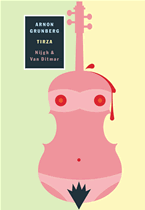Arnon Grunberg
Tirza
Menace lurking beneath every word
It is nothing short of remarkable how Arnon Grunberg continually reinvents himself. Each new book is strikingly different from the last, but at the same time they are all unmistakably Grunberg with his unforgiving eye for human frailties and compelling, wryly ironic style. At first glance, the bizarre, sadistic universe that informed Grunberg’s earlier works seems to be absent from Tirza.
Jörgen Hofmeester, a book editor edging toward retirement, leads a conspicuously dull, bourgeois existence: ‘His one comfort in life was that the better part of it lay behind him.’ In the novel’s understated opening scene, we see Hofmeester preparing sushi for his youngest daughter Tirza’s graduation party.
Yet, as in Dostoyevsky, after the apparently quiet opening, things inexorably start to unravel. Not with flashy stylistic fireworks or the snappy one-liners typical of Grunberg’s previous works, but in language that is as taut as it is restrained. It is a quiet, low-key story, but in that quiet the reader can hear the footsteps of Fate approaching.
In scene after scene Hofmeester is stripped of life’s apparent certainties. His wife, who had left him years before for a childhood sweetheart, makes an unexpected reappearance, turning his sedate household upside-down. Without warning, Hofmeester is laid off at the publishing house. Then Tirza, the apple of his eye, threatens to leave for Africa with her boyfriend, whom Hofmeester can only see as the doppelgänger of Mohammed Atta, the terrorist.
Although we witness a number of painful and strange confrontations between Hofmeester and his wife, and between Hofmeester and Mohammed Atta, ‘the beast’ that Hofmeester believes lives in the people around him, remains hidden. In reality, this beast dwells within himself.
Once Hofmeester leaves for Africa in search of his daughter, Grunberg shifts into top gear, taking the reader along for the ride. Then out of nowhere, in mid-paragraph, he drops a bombshell, and everything we have read up to that point is cast in a new, astonishing light. Grunberg’s remarkable control of the plot, the cool tone and the sense of menace lurking behind every sentence, beneath every word, make Tirza a true tour de force.
Publisher
Nijgh & Van Ditmar
Singel 262
NL - 1016 AC Amsterdam
TEL. +31 20 551 12 62
FAX +31 20 627 36 26
E-mail: [email protected]
Website: www.uitgeverijnijghenvanditmar.nl
Rights
Sterling Lord Literistic, Inc.
E-mail: [email protected]
Website: www.sll.com
Publishing details
Tirza (2006, 432 pp)

Biography
Arnon Grunberg (b. 1971) debuted at the age of 23 with the novel Blauwe maandagen (Blue Mondays, 1994), which describes the world of prostitution with wry humour and was an instant success. His next two novels, Figuranten (Silent Extras, 1997) and Fantoompijn (Phantom Pain, 2000), strengthened both the readers’ and the critics’ conviction that he is a great writer. Some of his other titles are De asielzoeker (The Asylum Seeker, 2003) and De joodse messias (The Jewish Messiah, 2004). Grunberg also writes plays, essays and travel columns. His work has won him several literary awards, among which the AKO Literature Prize for Fantoompijn and De asielzoeker, and both the Libris Literature Prize and the Flemish Golden Owl Award for Tirza (2006). Under the pseudonym Marek van der Jagt he published the successful novels De geschiedenis van mijn kaalheid (The Story of my Baldness, 2000) and Gstaad 95-98 (2002), as well as the essay Monogaam (Monogamous, 2004). Arnon Grunberg lives and works in New York.
Website: www.arnongrunberg.com
Dossier
Quotes
Grunberg places the anxiety for meaninglessness and loss of control right in the centre of our post- 9/11 era, he makes it tangible and comprehensible, he exhibits empathy but at the same time scoffs in the face of the middle class.
NRC Handelsblad
Tirza is both a clear and dark representation of what people inflict upon themselves and thus upon one another. […] With this novel, Grunberg advances slowly but surely toward the class of major authors who write lucidly about the incomprehensibility of human actions.
Haarlems dagblad
Translations
- Tirza. Zürich: Diogenes, 2008
- Tirza. Istanbul: Alef Yayinevi, 2008
- [Tirza ē basilissa tou ēliou]. Athéna: Kastaniotis, 2010
- Continued...
Rights sold
- Humanitas (Bucuresti, Roemenië)
- SysPrint (Zagreb, Kroatië)
- Hakibbutz Hameuchad - Sifriat Poalim (Bnei Brak, Israel)
- Continued...
